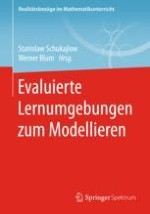2018 | OriginalPaper | Buchkapitel
6. Schülererfahrungen mit Aktivitäten zur Modellentwicklung: Über die Korrektheit hinausgehen, um die Bedürfnisse eines Kunden zu erfüllen
Übersetzung von Kapitel 5
verfasst von : Dr. Corey Brady, Dr. Cheryl Eames, Dr. Richard Lesh
Erschienen in: Evaluierte Lernumgebungen zum Modellieren
Verlag: Springer Fachmedien Wiesbaden
Aktivieren Sie unsere intelligente Suche, um passende Fachinhalte oder Patente zu finden.
Wählen Sie Textabschnitte aus um mit Künstlicher Intelligenz passenden Patente zu finden. powered by
Markieren Sie Textabschnitte, um KI-gestützt weitere passende Inhalte zu finden. powered by
